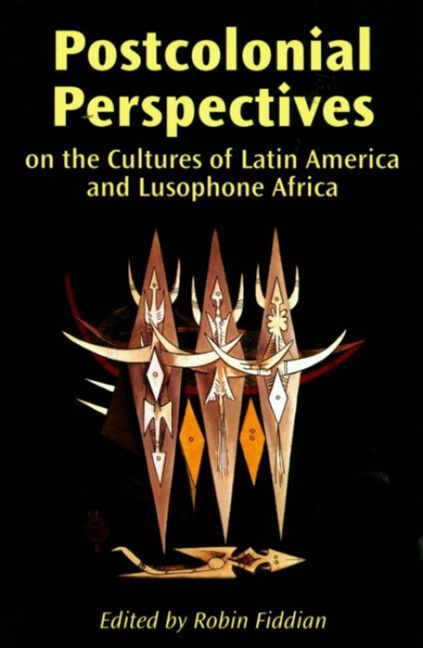Book contents
- Frontmatter
- Contents
- Preface
- Locating the Object, Mapping the Field: the Place of the Cultures of Latin America and Lusophone Africa in Postcolonial Studies
- Chapter One On Metropolitan Readings of Latin American Cultures: Ethical Questions of Postcolonial Critical Practice
- Chapter Two Ig/noble Barbarians: Revisiting Latin American Modernisms
- Chapter Three José Carlos Mariátegui: Culture and the Nation
- Chapter Four Doing Time in Peru: the Poetics of Multitemporality as Method for Cultural History
- Chapter Five America, Americanism and the Third World in the Work of Leopoldo Zea
- Chapter Six Fernando Ortiz's Transculturation: the Postcolonial Intellectual and the Politics of Cultural Representation
- Chapter Seven Caribbean Masks: Frantz Fanon and Alejo Carpentier
- Chapter Eight Colonial Crosswords: (In)voicing the Gap in Mia Couto
- Index
Locating the Object, Mapping the Field: the Place of the Cultures of Latin America and Lusophone Africa in Postcolonial Studies
- Frontmatter
- Contents
- Preface
- Locating the Object, Mapping the Field: the Place of the Cultures of Latin America and Lusophone Africa in Postcolonial Studies
- Chapter One On Metropolitan Readings of Latin American Cultures: Ethical Questions of Postcolonial Critical Practice
- Chapter Two Ig/noble Barbarians: Revisiting Latin American Modernisms
- Chapter Three José Carlos Mariátegui: Culture and the Nation
- Chapter Four Doing Time in Peru: the Poetics of Multitemporality as Method for Cultural History
- Chapter Five America, Americanism and the Third World in the Work of Leopoldo Zea
- Chapter Six Fernando Ortiz's Transculturation: the Postcolonial Intellectual and the Politics of Cultural Representation
- Chapter Seven Caribbean Masks: Frantz Fanon and Alejo Carpentier
- Chapter Eight Colonial Crosswords: (In)voicing the Gap in Mia Couto
- Index
Summary
The Americas
The place of America in the field of postcolonial studies is a matter of keen debate, the principal terms of which were rehearsed in three interrelated articles from the early and mid-1990s. The first of these was a polemical essay by anthropologist J. Jorge Klor de Alva, which was published originally in 1992 in Colonial Latin American Review and reappeared in a revised and expanded version in another publication three years later. Confronting an increase in the number of applications of postcolonial theory to ‘(Latin) American experience’ (sic), Klor de Alva asked rhetorically, ‘is an error being committed when scholars apply tools and categories of analysis developed in the twentieth century for understanding British colonialism, especially in India and Africa, to make sense of the experiences of sixteenth to eighteenth century Latin America?’ (264), and contended that ‘(Latin) American experience has been “colonized” after the fact’ (241). Essentially, Klor de Alva's thesis was that the American experience of colonialism differed so radically from that of colonized peoples in territories such as India, Indonesia, South Africa and Algeria that neither the category of ‘colonialism’ nor those of ‘decolonization’ and ‘postcolonialism’ could be made to serve a ‘useful’ purpose in the interpretation of ‘the complex political and cultural processes that engendered postcontact and postindependence American societies’ (248).
Written clearly as a provocation, Klor de Alva's essay was not without quirkiness or partiality. For one thing, it rested on a clever preemptive strategy which entailed the prior calling into question of the concept of colonialism, or, at least, of a certain way of understanding colonialism, in order to disqualify the concepts of decolonization and postcolonialism that followed from it. Yet, in the process, Klor de Alva proposed a definition of postcoloniality as ‘a form of contestatory/oppositional consciousness, emerging from either preexisting imperial, colonial, or ongoing subaltern conditions, which fosters processes aimed at revising the norms and practices of antecedent or still vital forms of domination’ (245), that is virtually identical to standard characterizations of the postcolonial.
- Type
- Chapter
- Information
- Publisher: Liverpool University PressPrint publication year: 2000

